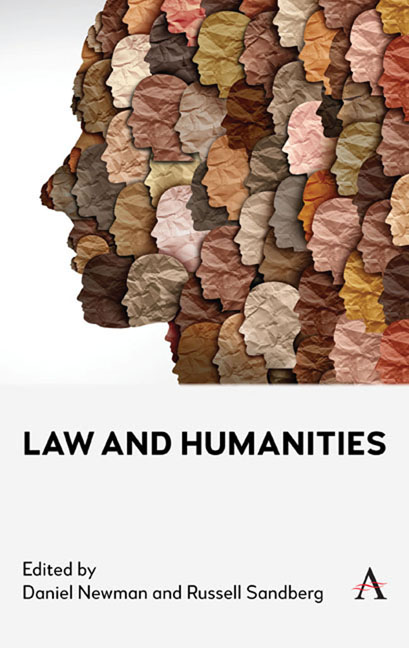Book contents
- Frontmatter
- Contents
- Preface
- List of Contributors
- Chapter One Introducing Law and Humanities
- Chapter Two Law and Archaeology
- Chapter Three Law and Comics/Graphic Justice
- Chapter Four Law and Film
- Chapter Five Law and Geography
- Chapter Six Law and History
- Chapter Seven Law and Literature
- Chapter Eight Law and Philosophy
- Chapter Nine Law and Popular Music
- Chapter Ten Law and Religion
- Chapter Eleven Law and Television
- Chapter Twelve Law and Theatre
- Chapter Thirteen Law and Theology
- Chapter Fourteen Law and Video Games
- Chapter Fifteen Conclusion: Subverting the Law and Humanities Canon
- Index
Chapter Fourteen - Law and Video Games
Published online by Cambridge University Press: 27 March 2024
- Frontmatter
- Contents
- Preface
- List of Contributors
- Chapter One Introducing Law and Humanities
- Chapter Two Law and Archaeology
- Chapter Three Law and Comics/Graphic Justice
- Chapter Four Law and Film
- Chapter Five Law and Geography
- Chapter Six Law and History
- Chapter Seven Law and Literature
- Chapter Eight Law and Philosophy
- Chapter Nine Law and Popular Music
- Chapter Ten Law and Religion
- Chapter Eleven Law and Television
- Chapter Twelve Law and Theatre
- Chapter Thirteen Law and Theology
- Chapter Fourteen Law and Video Games
- Chapter Fifteen Conclusion: Subverting the Law and Humanities Canon
- Index
Summary
Introduction
This chapter aims to position law and video games as an emerging and promising sub-field of law and humanities scholarship. Video games, sometimes referred to as ‘computer games’, ‘digital games’ or ‘electronic games’, have garnered an immense following, captivating billions of players worldwide and generating nearly $200 billion in revenue in 2022 alone. Despite the widespread popularity and significant market presence of video gaming, law and humanities scholarship has largely overlooked the exploration of video games as rich cultural artefacts with legal entanglements. Or perhaps, if there has been interest, the modal peculiarities of video games have acted as a deterrent for legal scholars to tackle them as a site of analysis.
Fortunately, within the field of game studies or ludology, the discipline that primarily studies video games, there has been a rapid evolution of literature examining video games as objects of analysis. This vibrant body of scholarship offers valuable insights and approaches that can greatly complement and inform emerging law and video games research. This interdisciplinary dialogue between fields holds the potential to shed light on the complex legal dimensions of video games and enrich our understanding of intricate interplay between the forms. Or as Greg Lastowka puts it simply, ‘those who study games and those who study law have things to learn from another’.
How to Play: A Video Game Tutorial
While it may seem trite to provide an explanation of the video game medium within this chapter, assuming familiarity may do a disservice to potential entrants into the field who haven’t yet had much exposure to the wonderful world of video games or may not have directly experienced their components for themselves. Unlike literature, art, music and film, video games occupy a somewhat niche space due to their historical reliance special-ised hardware – such as a console or gaming PCs – for play. However, with the advent of smartphones, video games have become increasingly accessible to a wider audience.
Video games resist simple definitions due to the fluidity of their constituent parts – they are multimodal combinations that may contain aspects of code, art, music, text, cinematic cut scenes, gameplay mechanics and narrative, which are combined to engage a person in play. Through these interactive experiences, players navigate virtual spaces, solve puzzles, combat enemies and manipulate avatars or in-game objects in pursuit of the game’s objectives.
- Type
- Chapter
- Information
- Law and Humanities , pp. 209 - 224Publisher: Anthem PressPrint publication year: 2024



